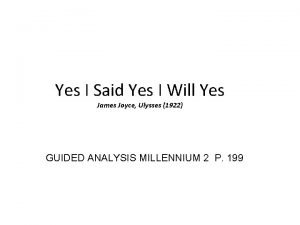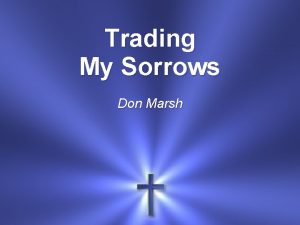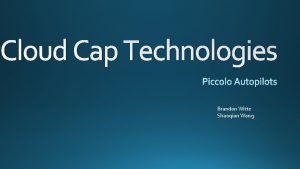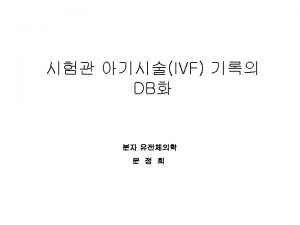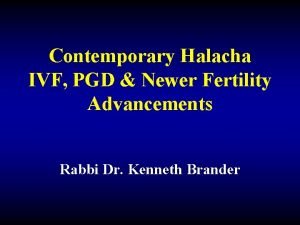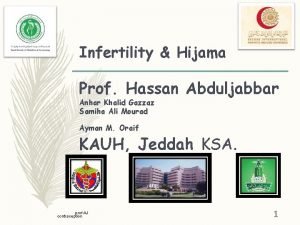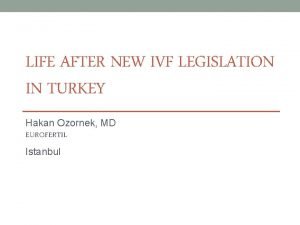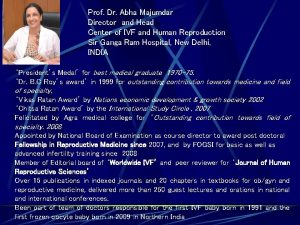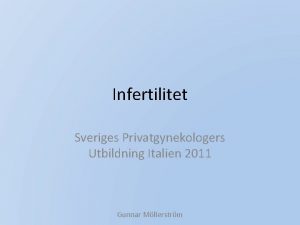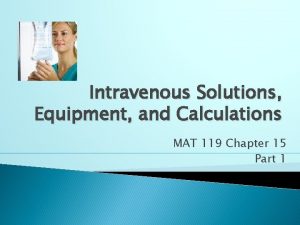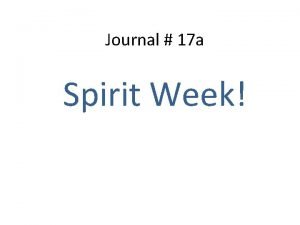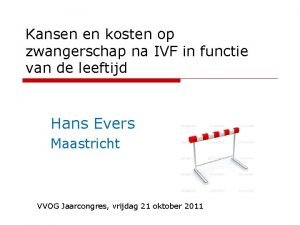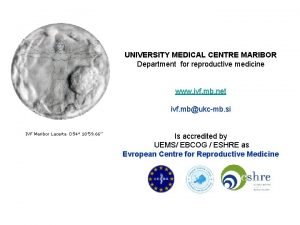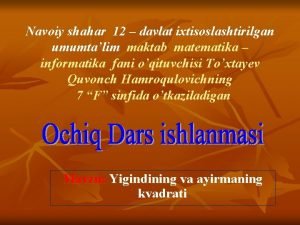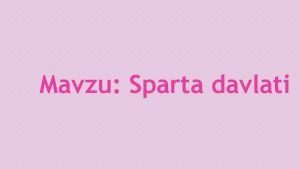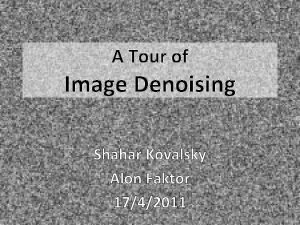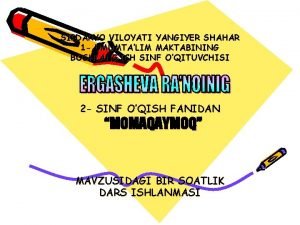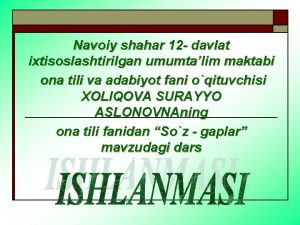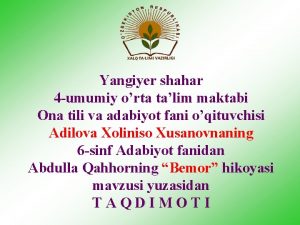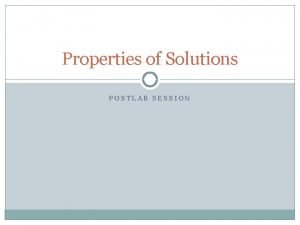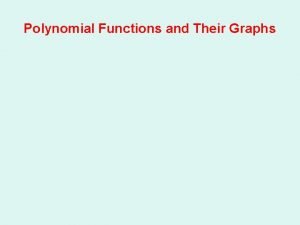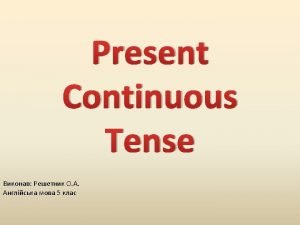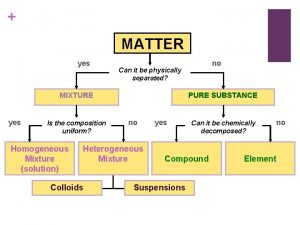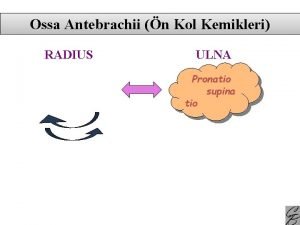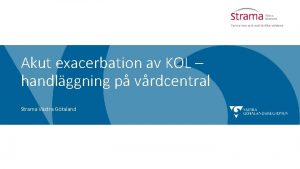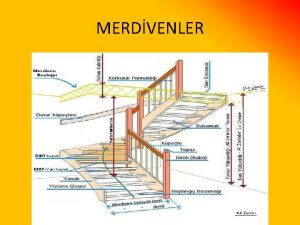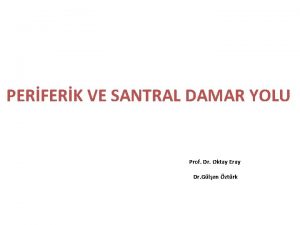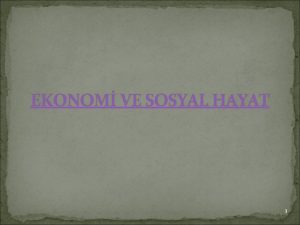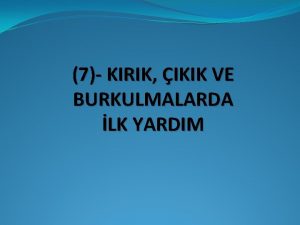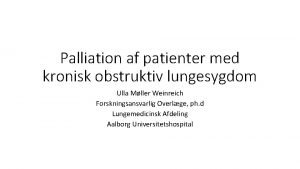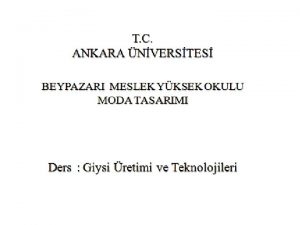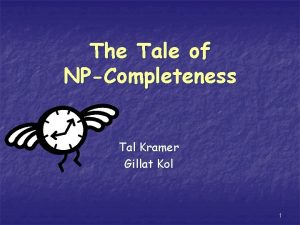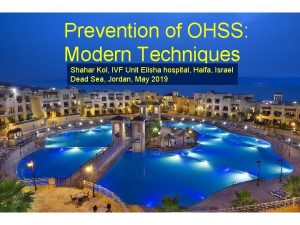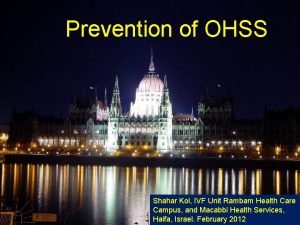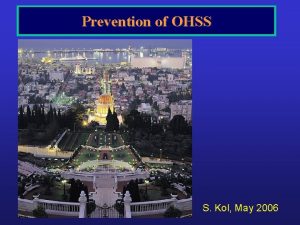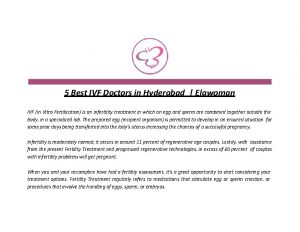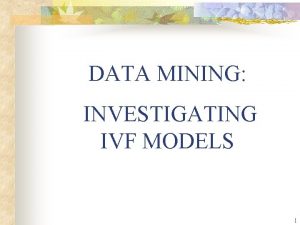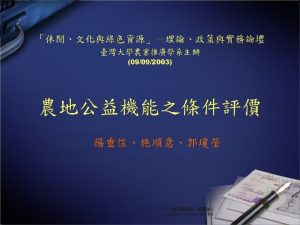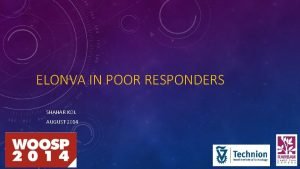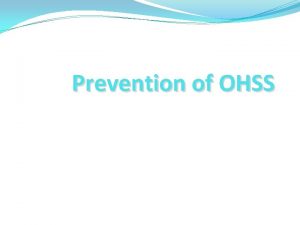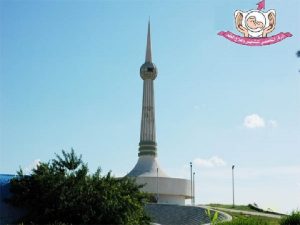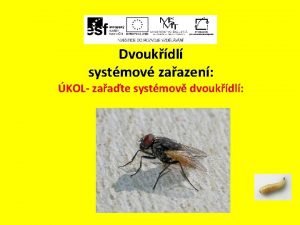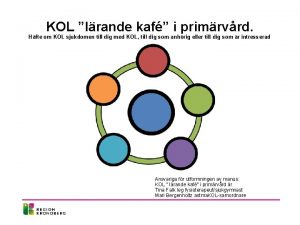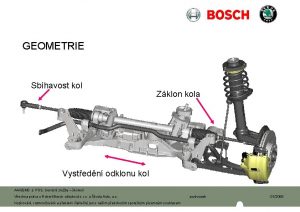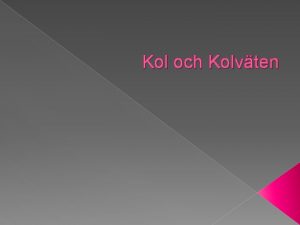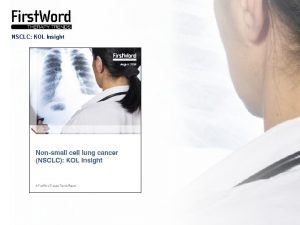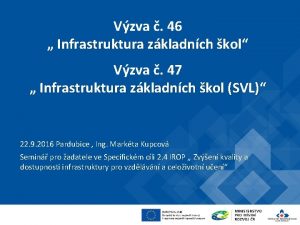OHSS PREVENTION YES WE CAN Shahar Kol IVF








































- Slides: 40

OHSS PREVENTION: YES, WE CAN! Shahar Kol, IVF Unit Rambam Health Care Campus, and Faculty of Medicine, Technion, Israel Institute of Technology, February, 2014

Faculty Disclosure X No, nothing to disclose Yes, please specify: Off-Label Product Use Will you be presenting or referencing off-label or investigational use of a therapeutic product? No X Yes, please specify: The use of Gn. RH agonists for ovulation triggering in IVF

CONTENT • OHSS: is it still a problem? • No OHSS post agonist trigger! • Mechanism? • Failures? • The question of pregnancy rate. • Agonist trigger: back to physiology. • Agonist trigger is not the issue, luteal support is. Meta-analysis should follow. • A revolution in the making.

OHSS: IS IT STILL A PROBLEM? “We did not have a single case in years. ”

SEVERE OHSS: IS IT STILL A PROBLEM? “In 2003 -2005, 4 deaths (of the 12) were due to OHSS”. ~3 OHSS-related deaths per 100, 000 ART cycles.

Three OHSS-related deaths (3: 100, 000 ART cycles), all had their embryos frozen. Braat et al, 2010

INCIDENCE OF OHSS Objective: Objective to determine OHSS incidence in 2, 524 antagonist-based cycles (1801 patients). Results: Results fifty three patients (2%) were hospitalized because of OHSS. Conclusions: Conclusions clinically significant OHSS is a limitation even in antagonist cycles. “There is more than ever an urgent need for alternative final oocyte maturation – triggering medication” F&S January 2006

HOW TO PREVENT OHSS? • Agonist trigger is the most effective approach.

PRE-ANTAGONIST ERA

ANTAGONIST ERA Use of a single bolus of Gn. RH agonist triptorelin to trigger ovulation after Gn. RH antagonist ganirelix treatment in women undergoing ovarian stimulation for assisted reproduction, with special reference to the prevention of ovarian hyperstimulation syndrome: preliminary report: Short communication. Itskovitz-Eldor et al. 2000

16 publications Ovulation trigger n OHSS % (n) RCT, high risk Oocyte source own Gn. RHa h. CG Engamnn et al 2008 RCT, high risk own Gn. RHa h. CG Acevedo et al 2006 RCT donors Gn. RHa h. CG Bodri et al 2009 Retrospective donors Gn. RHa h. CG Griesinger et al 2010 Observational, High risk RCT own Gn. RHa 15 13 33 32 30 30 1046 1031 40 0 (0/13) 31(4/13) 0 (0/33) 31 (10/32) 0 (0/30) 17 (5/30) 0 (0/1046) 1. 3 (13/1031) 0 (0/40) own Gn. RHa h. CG Engmann et al 2006 Retrospective, casecontrolled, high risk own Gn. RHa h. CG 152 150 23 23 0 (0/152) 2 (3/150) 0 (0/23) 4 (1/23) Manzanares et al 2009 Retrospective casecontrol, high risk own Gn. RHa h. CG - cancelled 42 0 (0/42) Hernandez et al 2009 Retrospective donors Gn. RHa h. CG Orvieto et al 2006 Retrospective, high risk: agonist arm only own Gn. RHa h. CG donors Gn. RHa h. CG 254 175 82 69 32 42 0 (0/254) 6 (10/175) 0 (0/82) 7 (5/69) 0 (0/32) 1 (1/42) Sismanoglu et al 2009 RCT donors Gn. RHa h. CG Humaidan et al 2009 Observational, high risk own Gn. RH, luteal rescue with h. CG 1500 IU 44 44 12 0 (0/44) 7 (3/44) 8 (1/12) Galindo et al 2009 RCT donors Gn. RHa h. CG Melo at al 2009 RCT donors Gn. RHa h. CG Shahrokh et al 2010 RCT, high risk own Gn. RHa h. CG 106 50 50 45 45 0 (0/106) 8 (9/106) 0 (0/50) 16(8/50) 0 (0/45) 15 (33) Reference Trial type Babayof et al 2006 Humaidan et al 2009 Agonist: 2, 005 patients, not a single case of OHSS! h. CG: 92 cases in 1, 810 patients, 5. 1% Shapiro et al 2007

WHAT REALLY WORKS: ● Gn. RH agonist versus h. CG for oocyte triggering in Gn. RH antagonist ART cycles Total events 0 (Gn. RH) 21 (h. CG) Youssef MA, et al. Human Reprod Update 2010; 16: 459– 466

Mechanism of OHSS prevention? Lower levels of inhibin A and pro-alpha C during the luteal phase after triggering oocyte maturation with Gn. RH agonist versus h. CG Nevo et al. 2003

Luteal phase Natural cycle day 7 -9= 75 pg/ml vs. 18 Natural cycle day 7 -9= 750 pg/ml vs. 184 Nevo et al, 2003

SUMMARY • The lower levels of luteal steroidal and nonsteroidal hormones reflect luteolysis, and may explain the mechanism of OHSS prevention by Gn. RH-a. • Pregnancy post agonist trigger does not rescue the CL!!! Nevo et al, 2003

A safe and OHSS-free clinical environment

FAILURES? OHSS prevention by Gn. RH agonist triggering of final oocyte maturation in a Gn. RH antagonist protocol in combination with freeze-all strategy: a prospective multicenter study • Conclusions: “…a single case of a severe early onset OHSS occurred” – E 2 trigger day=47, 877 pmol/L – 13 oocytes – The patient was hospitalized on day of OPU, with abdominal distension, drastically enlarged ovaries (right and left ovarian volume 363 cm 2 and 261 cm 2, respectively), and lower abdominal pain. • She received low molecular weight heparin, cabergoline (0. 5 mg/d), and IV infusion therapy, including albumin. Griesinger G, et al. Fertil Steril 2011; 95: 2029– 2033

FAILURES? (CNT’D) – “drastic decrease of hemoglobin levels to 4. 9 mmol/L” (8 grams/d. L) patient received blood transfusion 2 days post OPU. – Hematocrit: 41 trigger day, 37 OPU day, ‘, <35’ post blood transfusion. – 3– 4 days post trigger 3. 9 litres of “blood-stained ascites which was indicative of a subacute intraperitoneal hemorrhage”.

PREGNANCY RATE POST AGONIST TRIGGER • We showed that agonist trigger causes quick and irreversible luteolysis. • Therefore, the right luteal support is crucial. • The evolution of post agonist luteal support.

LUTEAL PHASE – NON-SUPPLEMENTED • Beckers et al (2003) – very low pregnancy rate.

LUTEAL PHASE – CONVENTIONAL SUPPORT Not good enough!

LUTEAL PHASE – MODIFIED SUPPORT We are getting there!

LUTEAL PHASE: INTENSIVE E+P OHSS high-risk patients Engmann et al, 2008



ALL FREEZE ADVANTAGES • No OHSS • Better endometrium in thaw cycles. • Less ectopic pregnancies in thaw cycles. • Comparable, or even better, clinical outcome in thaw cycles. • Better obstetric outcome? • Fresh transfer post agonist trigger requires daily IM injections of progesterone in oil.

…AND WHEN OHSS IS NOT THE MAIN ISSUE? . . . “… 42% of those who received h. CG reported subjective complaints (mostly abdominal discomfort), whereas this percentage was 0% in those who received Gn. RH agonist to trigger ovulation. Cerrillo et al, 2009

HCG DOES NOT IMITATE PHYSIOLOGY! LH surge goes together with FSH surge. Is FSH surge redundant? Gonen et al 1990

DUAL ROLE OF HCG TRIGGER • Final oocyte maturation. • Early luteal phase stimulation. • Same dose for both functions? h. CG

Gonadotropin-releasing hormone agonist versus HCG for oocyte triggering in antagonist assisted reproductive technology cycles. 11/2010 ü Totally different approaches to luteal support, no common ground for comparison. ü Agonist triggering is not the issue, individualized luteal support is!

Plain language summary: “We recommend that Gn. RH agonist as a final oocyte maturation trigger should be not used”. 1985: In view of the poor reproductive outcomes following IVF we believe there is no indication for further research with IVF for the treatment of infertile couples…

FURTHER RESEARCH • Agonist trigger in “empty follicle syndrome” • Agonist trigger in “egg factor” infertility • Agonist trigger in repeated IVF failure cases. • Immature eggs post h. CG in face of adequate follicular size on trigger day. • h. CG-based, P-free luteal support post agonist trigger

NON OHSS-HIGH-RISK PATIENTS: SIDE BENEFITS • Agonist trigger: more MII oocytes compared with h. CG trigger 1 -4 • Potential benefit of FSH surge: 5 -9 • Promotes LH receptor formation in luteinizing granulosa cells • Promotes nuclear maturation (i. e. resumption of meiosis) • Promotes cumulus expansion 1. 2. 3. 4. 5. 6. 7. 8. 9. Humaidan P, et al. Reprod Biomed Online 2005; 11: 679– 684 Humaidan P, et al. Human Reprod 2009; 24: 2389– 2394 Imoedemhe DA, et al. Fertil Steril 1991; 55: 328– 332 Oktay K, et al. Reprod Biomed Online 2010; 20: 783– 788 Eppig JJ. Nature 1979; 281: 483– 484 Strickland Beers. J Biol Chem 1976; 251: 5694– 5702 Yding Andersen C. Reprod Biomed Online 2002; 5: 232– 239 Yding Andersen C, et al. Mol Hum Reprod 1999; 5: 726– 731 Zelinski-Wooten MB, et al. Human Reprod 1995; 10: 1658– 1666

THE ADVANTAGE FOR THE ‘NORMAL RESPONDER’ Antagonist FSH/h. MG Kol S, et al. Human Reprod 2011; 26: 2874– 2877 Agonist trigger OPU 36 hours 1500 IU h. CG ET 4 days 1500 IU h. CG

Stimulation characteristics and embryology data Stimulation (days) 9. 3 ± 2. 0 Gn. RH antagonist (days) 3. 8 ± 0. 9 FSH (units) 2443 ± 925 E 2 day of trigger (pmol/L) 3764 ± 1227 P day of trigger (nmol/L) 2. 4 ± 1. 65 LH day of trigger (IU/L) 1. 9 ± 1. 3 Oocytes retrieved 6. 7 ± 2. 5 Embryos obtained 3. 6 ± 1. 7 Embryos transferred 2. 9 ± 0. 9 Embryos frozen 0. 8 ± 1. 5 Beta h. CG (IU/L) 152 ± 86 E 2 (day of pregnancy test, pmol/L) 6607 ± 3789 P (day of pregnancy test, nmol/L) 182 ± 50 Values are mean ± SD Reproductive outcomes Positive h. CG/cycle, n (%) 11/15 (73) Clinical ongoing pregnancy, n (%) 7/15 (47) Early pregnancy loss, n (%) 4/11 (36) Kol S, et al. Human Reprod 2011; 26: 2874– 2877

WHAT DO PRACTITIONERS SAY? Among the five most downloaded papers

SURVEY RESULTS: Triggering of ovulation with Gn. RH-a in ART: Worldwide feedback on an emerging new option with great potential TAKE HOME MESSAGE “The results of this survey indicate that Gn. RH trigger is widely used worldwide and therefore has become part of the standard of care today. Hence, doctors are entitled to prescribe it just as patients may ask that this option is considered in their case. ”

“Agonist triggering is viewed as one of the major advances in ovarian stimulation, with the potential to eliminate OHSS…”

Revolution in the making In Out Antagonist-based protocols “long agonist” protocols Agonist trigger h. CG trigger LH activity-based luteal support Progesterone-based luteal support Total OHSS elimination ~1% severe OHSS Patient friendly luteal phase Painful P injections or leaky, messy vaginal P.

Thank you
 Yes i said
Yes i said Im trading
Im trading Cloud cap technologies
Cloud cap technologies Primary prevention secondary prevention tertiary prevention
Primary prevention secondary prevention tertiary prevention Trading
Trading Gv egg ivf
Gv egg ivf Ivf halacha
Ivf halacha Hijama for infertility
Hijama for infertility Ivf
Ivf Dr abha majumdar success rate
Dr abha majumdar success rate Amennore
Amennore Ivf calculation formula
Ivf calculation formula Ivf sentence
Ivf sentence Ivf kansen
Ivf kansen Ivf maribor
Ivf maribor Ivf fangos
Ivf fangos Streckod
Streckod Qisqa ko'paytirish formulalari
Qisqa ko'paytirish formulalari Professor eyal shahar
Professor eyal shahar Sparta polisi
Sparta polisi Shahar kovalsky
Shahar kovalsky Qoqioʻt
Qoqioʻt Anat shahar
Anat shahar 165 mashq
165 mashq Abdulla qahhor sarob romani
Abdulla qahhor sarob romani Mongo seeds will dissolve in one cup water
Mongo seeds will dissolve in one cup water Graphing polynomial functions
Graphing polynomial functions I am you are he is she is it is we are you are they are
I am you are he is she is it is we are you are they are Matter can it be physically separated yes or no
Matter can it be physically separated yes or no Speak english
Speak english Kol nidrei text
Kol nidrei text N kol
N kol Sputumpurulens
Sputumpurulens Barak kol
Barak kol Iki kollu orta sahanlıklı düz merdiven
Iki kollu orta sahanlıklı düz merdiven Cut down damar yolu
Cut down damar yolu Kol gücünden makine gücüne geçiş
Kol gücünden makine gücüne geçiş Kol askısıyla önkol bilek ve el tespiti
Kol askısıyla önkol bilek ve el tespiti Respiratorisk acidose kol
Respiratorisk acidose kol Kol yırtmacı çeşitleri
Kol yırtmacı çeşitleri Gillat kol
Gillat kol
